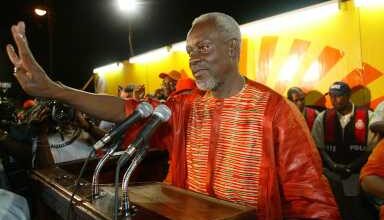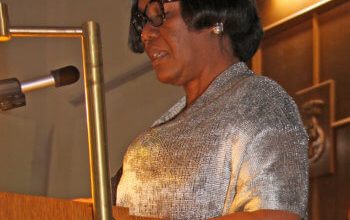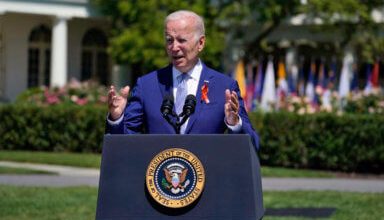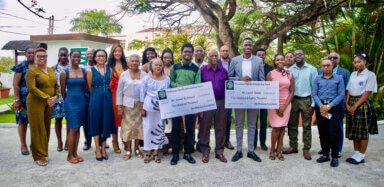Caribbean RoundUp
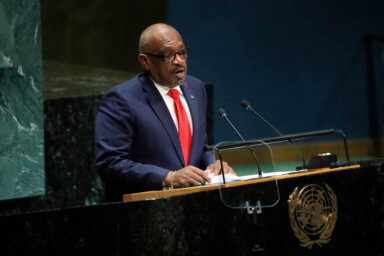
Antigua and Barbuda
Antigua and Barbuda accused the international community of seeking to prevent countries from resuming commercial whaling. Members of the International Whaling Commission (IWC) were also accused of “refusing to accept the responsibility of the organization to engage in the management of this resource.”
At the 69th IWC meeting, Antigua and Barbuda’s IWC Commissioner, Daven Joseph, said members were refusing to consider the food security situation of all coastal states interested in utilizing the whaling resource.
“I am listening to many countries here that are almost telling us, almost dictating the rights of all countries in terms of what we should eat, what we should not eat,” Joseph said.
“You have no right to tell us that whales should not be used for food. It is a colonial posture that has to stop in this organization. How dare you want to tell countries what they should and should not use as dietary supplements? The world is listening,” he said.
Joseph told the IWC that the world is “seeing the bigotry in that organization and I hope the question of food security as we developing countries see it will get much sympathy from those of us who have food in abundance.”
“How dare you tell us we should not look at whales as a form of food. This organization has no right to relegate us to what you think we should eat and should not eat. This is a sad day for this organization when I listened to some of the comments coming from developed countries.“
“We do not want you to dump your food on us. We want to eat what we want to eat,“ Joseph said.
“We wish for this commission to acknowledge that whale stocks were over-exploited for many years and further acknowledge that, through careful conservation and management plans of this august body, whale stock populations have significantly increased,“ he added.
Antigua and Barbuda has proposed a resolution calling for the Implementation of a Conservation and Management Program for Whale Stocks Aimed at the Orderly Development and Management of the Whaling Industry.
Bahamas
The Bahamas government will launch a savings bond initiative, with the first sale scheduled for November.
Governor of the Central Bank of The Bahamas (CBB) John Rolle said the initiative will start modestly, with an initial offering of five million US dollars.
“For the rest of the government’s fiscal year, we have set a cumulative target of between US$10 million to US$17 million, depending on public interest. With these levels of activity, it must be emphasized that the objectives of this program are more about encouraging savings rather than providing the government with any new substantial source of funding,“ he said.
The Central Bank of The Bahamas will act as the arranger and registrar of the Bahamas Government Savings Bond, which “aims to incentivize increased personal savings by paying interest rates that are competitive in comparison to the returns on deposits; facilitating affordable, incremental growth in savings over time; and by offering predictable access to withdrawals in the event of urgent financial needs.“
The CBB said that the savings bonds will be a low-risk, short—to medium-term product that can be purchased in increments as low as US$100 and that they will pay interest at rates reasonably close to those earned on Bahamas Registered Stocks of similar maturities.
Rolle said that the program is designed to facilitate easier access to savings opportunities and encourage increased savings by enabling individuals to build up their holdings in affordable increments.
Dominica
The Dominica government says it remains confident that the geothermal energy power plant will be commissioned by 2026 after signing a contract worth almost US$40 million with an Indian company.
Minister of Energy Dr. Vince Henderson said that while steady progress has been made on the geothermal energy development project, developments in the Middle East will likely affect the project timeline.
He said that recently, the Dominica Geothermal Development Company signed a contract for US$38.9 million with the Indian-based company to construct 10 kilometers of transmission lines with substations from Laudat, a small village in the center of the island located between three mountains, to Fond Cole, on the outskirts of the capital.
“We are very excited about that milestone because it means that the company has started mobilizing, and very shortly, we will see actual action on the ground so that construction can begin within the next several weeks.
“This is an important milestone we have reached, and work is also ongoing for the construction of the power plant at Laudat. A local company has been awarded the contract for site preparation,“ Henderson said.
“We expect that by October of this year, most of the equipment will arrive on the island, and by early next year, we can see construction in earnest for the first 10-megawatt geothermal plant.“
But Henderson said that while the project is on schedule and hopes to be completed by the end of 2025, there have been several challenges, “especially with the conflict in the Middle East, considering that most of our equipment comes out of Israel. Many of the personnel as well for that (Indian) company are based in Israel.
“So in spite of these challenges, we still are on target, on schedule and we hope we can have the plant commissioned by early 2026, once construction is completed by December 2025.“
Guyana
Guyana recently announced the launch of a Global Biodiversity Alliance and will host its inaugural summit. The alliance will focus on creating a market for biodiversity credits.
President Dr. Irfaan Ali said during the 79th session of the United Nations General Assembly (UNGA) that the summit to be held in 2025 will also focus on scaling biodiversity conservation debt swaps, accelerating biodiversity bonds, establishing a blueprint for biodiversity taxonomies, and promoting nature-positive action.
“We do not make this announce ment by mere words. Guyana is also committed to doubling its protected areas by December 2025 and achieving the global biodiversity target of 30 percent by 2030.
“These are real solutions that Guyana is putting forward to address the global problem of biodiversity loss. We do not lecture; we lead by example without arrogance,“ Ali told the global community.
“As a country, we are dedicated to the preservation of this vital global asset. I especially salute the Indigenous Peoples of Guyana, the Amerindians, who are the foremost stewards of this great natural heritage.
“We recognize their leadership, and 15 % of all revenues earned from carbon sales are directly transferred to our Indigenous communities.“
But he said even with its new-found natural oil and gas resource, it would require less than 20 % of sequestered carbon to offset Guyana’s emissions at maximum output.
“We have preserved our biodiversity and know its value. We believe it is only fair and just that this global asset be monetized in a fair carbon market,“ Ali said.
Haiti
World leaders meet in the United Nations to discuss the future of efforts to rein in the gangs strangling Haiti. However, Haitians are expressing hopelessness that an international response can turn the tide of violence.
The UN-backed force of 400 police from Kenya and about two dozen Jamaican officers have done very little to put an end to the country’s gangs, which have terrorized the country since the assassination of President Jovenel Moïse in 2021.
World leaders have been discussing the next steps in a complex effort to restore order to the Caribbean nation, with Kenya recently pledging 600 more officers.
The United States has floated the idea of a UN peacekeeping force. However, the idea was considered too controversial given the introduction of cholera and sexual abuse cases that occurred the last time UN troops were in Haiti.
The deployment of Kenyan forces was partly to avoid tensions that may be sparked by sending another UN peacekeeping mission.
However, during a recent visit to Haiti by Kenya’s President William Ruto on his way to the United Nations General Assembly session, Ruto said he would be open to expanding Kenya’s operations into a larger UN peacekeeping mission.
“On the suggestion to transit this into a fully UN Peacekeeping mission, we have absolutely no problem with it if that is the direction the UN Security Council wants to take,“ Ruto said.
However, while Ruto hailed the successes of the Kenyan forces, a recent report by a UN human rights expert said gang violence is spreading across Haiti and that Haitian police still lack the “logistical and technical capacity“ to fight gangs.
Jamaica
The Jamaica Council of Churches (JCC) recently warned against politicizing the Integrity Commission’s (IC) investigation into Prime Minister Andrew Holness’s financial affairs.
Both the ruling Jamaica Labour Party (JLP) and the main opposition People’s National Party (PNP) have been engaged in a tit-for-tat response to the IC report laid in the Parliament last week.
In its report, the Integrity Commission recommended that the Investigations Division, Financial Tax Administration Jamaica, and the Financial Services Commission examine the transactions of three companies linked to Prime Minister Holness, which amount to more than J$470 million.
Prime Minister Holness has already instructed his attorneys to initiate legal action against senior members of the PNP following comments about the Integrity Commission’s report on his financial affairs.
However, the PNP said it is not bothered by the threat of legal action and has called on Prime Minister Holness to step down in light of the Integrity Commission’s report.
In a statement, the JCC said it is urging caution and has called for patience and the allowance of due process in the matter.
“We strongly encourage the closure of the legal lacunae (space) that may have been identified as soon as possible,“ the JCC said in the statement.
It warned that politicization of the matter must be avoided.
“To this end, it is important that the process recommended by the IC be allowed to run its course,“ the JCC said, adding that “in view of the inconclusive nature of the report, it is advisable that partisan political interpretations and applications of the report are avoided until clarity is achieved.“
The JCC said it “affirms the value of respectful, honest, and robust national conversation that seeks to promote the nation’s well-being and encourages the principles of integrity, accountability, and transparency by those holding public office.
“Additionally, the JCC unequivocally asserts that this is not the time to contemplate changes to the Integrity Commission Act due to pressure from the Government, the Opposition and/or partisan public outcry.”
— Compiled by Devika Ragoonanan

